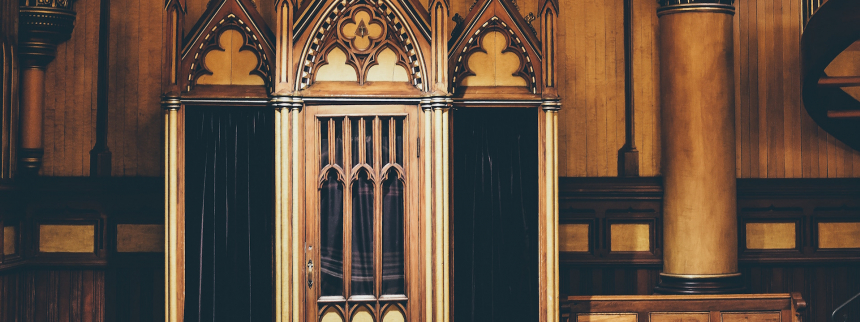
The State Legislature is considering a bill, SB 360, to regulate the Sacrament of Penance and force priests to break the Seal of Confession. In light of this proposed bill, Bishop Soto is encouraging all parishes from the Diocese of Sacramento to take action on the weekend of June 22-23 to oppose Senate Bill 360.
Following is the full text of Bishop Soto's letter.
---
Dear Friends in Christ:
Tell your State Assemblymember to vote “no” on SB 360. The California state senate bill, SB 360, has been proposed as an aid to prevent child sexual abuse. While this is an admirable aim, the bill misses the mark. Specifically, this bill attempts to do so by way of removing the legal protections surrounding the sacramental seal of confession, a legal protection which has been in place throughout the history of Church & State relations.
There is nothing intrinsic to this bill which creates a greater assurance or guarantees that future abuse will not happen. Instead, it mounts an assault on the fundamental liberties of Catholics in the state of California under the guise of greater protection. For this reason, all Catholics, religious people of any affiliation, and indeed all people of good will, should vigorously oppose SB 360.
Not only does SB 360 fail in its understanding of the role of the priest in the sacrament of reconciliation, but in fact it undermines the fundamental religious liberties of the penitent. As one of the seven sacraments of the Catholic Church, reconciliation is a “sacred moment” –a time when a man, woman, or child bares one’s soul to God, and asks for forgiveness for wrongs that he or she have committed. Catholics believe that this sacrament is a moment of grace: through the ministry of the priest the grace of forgiveness is granted, and the penitent is endowed with spiritual aid to go forth and not sin any longer.
This sacred moment is an intimate, vulnerable moment for the penitent. Intrinsic to the sacrament is the confidence that what is said in the confessional will remain there. Catholics, further, have the right to an anonymous confession; that is, one where the identity of the penitent is known only to God, and not even to the priest if they do not desire it. It is a place where assistance is given to those with marital difficulties, frustrations with the challenges of raising children, or even the long battle over addictions. So important is the sacrament of reconciliation in the life of a believer that the Catholic Church calls on its members to frequent the sacrament at least once a year in order to participate fully in the celebration of the Mass and receive the sacrament of the Holy Eucharist.
The effort to remove the legal protection that has been afforded to the seal of confession, then, is ultimately one which systemically introduces doubt into the psyche of those who would present themselves for the sacrament. There is, thus, a two-fold effect upon the penitent: the first is that it places a mental reservation into the middle of this sacred moment. No longer is this an honest, vulnerable moment, a moment of grace, but rather it places a barrier in between the believer and their religious encounter with their merciful Redeemer. Second, insofar as the barrier prevents them from having true reconciliation with God, it prevents them from being able to fully participate in the religious worship of the assembly.
Consequently, the bill takes aim not at clergy, requiring them to divulge the content of a particular confession, but attacks the very religious liberty of the nearly 11 million Catholics in the state of California.
This is a staggering and disturbing overreach of the state legislature. Unfortunately, and for many years now, there has been a trend to change the conversation from talking about “religious liberty” to merely a “freedom of worship”. As I have already noted, in the case of the sacramental seal, the overreach on the issue of religious liberty also limits the freedom of Catholic Faithful to worship freely and fully as a member of the body of Christ. Such a precedent is unconstitutional and unconscionable.
Such a precedent, furthermore, is being attempted with no compelling interest by the state: there is not a single case that can be pointed to by the authors of this legislation where information gained from opening the sacramental seal would be decisive in determining the innocence or guilt of a party, or, more importantly as it pertains to the rationale for putting forward the legislation, the assurance that children would be better protected.
Catholic priests are already mandated reporters. My priests have been given instruction on how to respond if a situation of abuse is divulged in the context of confession so that aid might be given without need of disclosing what was shared during this privileged communication. This bill places a dilemma in the conscience of the priest: does he break the sacred trust which has been given to him by God, or does he face prosecution by the civil courts? Either way, such legislation does not only affect the way the Catholic religion interfaces with the greater society, but interferes with the very structures of the religion itself.
The Catholic Church has worked tirelessly to create a culture of transparency and safety within our structures. Since 2002, the California dioceses have trained more than 1 million adults in proactive measures to protect children and young adults, and how to report misconduct. Our work is not finished, and we invite a respectful collaboration alongside of the state legislature to ensure that the vulnerable are indeed safe in all avenues of their life. SB 360 is a step in the wrong direction. Tell your State Assemblymember to vote “no” on SB 360.
Respectfully,
+Jaime Soto
Bishop of Sacramento
---
For more information and to take action, visit www.scd.org/keeptheseal

